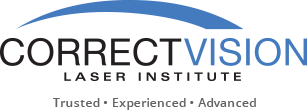Common Vision Impairments that Can Be Corrected with LASIK
 LASIK is the most popular laser surgery for correcting vision impairments caused by improper refraction. Many people who are fed up with contacts and glasses look to LASIK for a more permanent solution. If you’re experiencing one of these common conditions, the surgery may be able to help.
LASIK is the most popular laser surgery for correcting vision impairments caused by improper refraction. Many people who are fed up with contacts and glasses look to LASIK for a more permanent solution. If you’re experiencing one of these common conditions, the surgery may be able to help.
See Near, See Far
Myopia and hyperopia, commonly known as nearsightedness and farsightedness, occur when light fails to hit the retina properly. This is caused by an eyeball shape that is either too long or too short. Instead of landing on the retina, light falls either in front of it or behind it, resulting in blurred vision. To be corrected by LASIK surgery, the degree of error is mapped out by the surgeon and the cornea of the eye is re-shaped using a laser. You should be able to see clearly both up close and at a distance after recovering from the surgery.
No More Astigmatism
An uneven cornea is the culprit in astigmatism, another common condition that causes blurry vision. Unlike myopia and hyperopia, astigmatism can cause objects to appear out of focus at any distance, sometimes resulting in eye pain or headaches. Some milder cases of astigmatism cause no symptoms at all, so you could have it without even knowing. The corneal reshaping performed by LASIK surgeons works to correct this problem and restore stable vision.
Goodbye Reading Glasses?
If you’re over 40, chances are you’ve begun to notice some degree of presbyopia, a condition that makes it difficult to focus on objects close to your face. Headaches and eye fatigue are common symptoms, and most people rely on reading glasses to address these problems. LASIK may be able to help in some cases by correcting one eye to see close up and the other to see at a distance, a combination known as “monovision.” However, not everyone is able to adjust to this correction, so it’s recommended that you do a “trial run” with contact lenses first.
Consider the Risks
LASIK surgery isn’t for everyone, and the results aren’t always perfect. In general, the surgery isn’t recommended for children under 18 due to the rapid fluctuations in vision that can occur earlier in life. Some patients experience worsening of vision that requires a second surgery to be corrected. People participating in high-impact sports run the risk of dislocating the corneal flap that surgeons create to access the eye during the procedure. Vision may also be over- or under-corrected, and some people find that they wind up needing glasses or contacts even after undergoing the procedure. Dry eye is another potential side effect.
It’s important to talk with your eye doctor about all the options before electing to undergo LASIK surgery. Since the procedure isn’t reversible, you should know for sure beforehand if it’s the best option for correcting your vision. If you turn out not to be a good candidate, your doctor may be able to suggest alternative treatments.
Want to learn more about LASIK?
CorrectVision Laser Institute is one of Florida’s most advanced practices for vision impairments with extensive experience in LASIK. Our goal is to open your eyes to the world of great vision by offering unparalleled expertise and the most advanced technology available.
Contact us today for a consultation with one of our South Florida eye specialists, located in Hollywood, Weston and Pembroke Pines!

